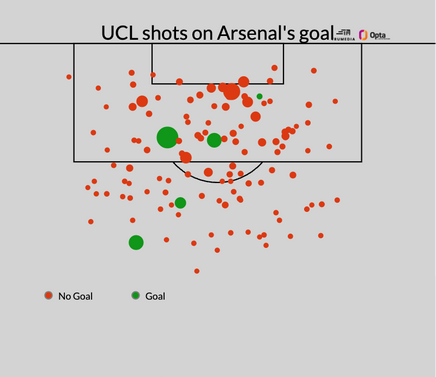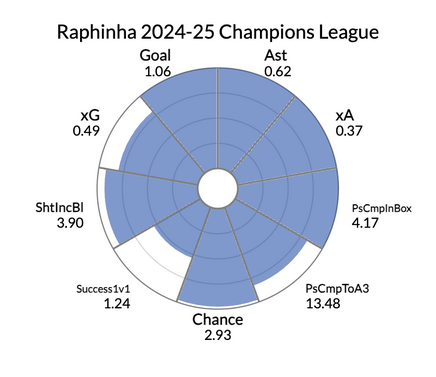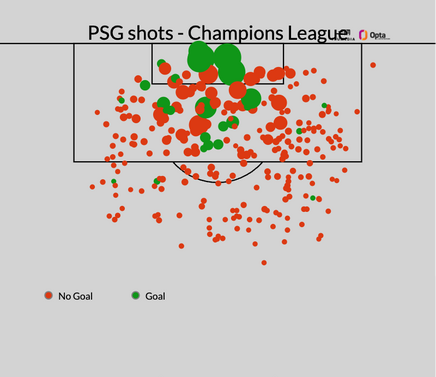With only three matches left, the four semi-finalists are just steps away from European club football`s most coveted prize. At this stage, previous performances matter less; each team has a genuine chance. Arsenal, Barcelona, Inter, and Paris Saint-Germain are all serious contenders, and it is entirely plausible that any one of them could be crowned champions in May.
Equally, none of these teams are flawless. Every single one has lost at least one match in the competition this season. Three of the four finished second, third, and fourth in the group stage, yet the team that barely qualified for the knockouts is just as highly regarded as the others. This truly appears to be a remarkably well-balanced field.
So, what are the key factors that might propel these teams to victory or lead to their elimination? Let`s explore below.
1. Arsenal
Why they will win the Champions League: Defensive Solidity
While Inter may have conceded fewer goals, no team restricts their opposition`s attacking opportunities as effectively as Arsenal. Across 12 matches, they have allowed opponents shots averaging just 0.69 non-penalty expected goals (npxG) per game. By nearly every defensive metric, Arsenal is elite. They limit opponents to an average of 16.4 touches in the penalty box per game, nearly five fewer than any other remaining team, and concede only 10.3 shots per game. This includes facing Real Madrid`s formidable attack, which struggled to create clear chances until an error led to one.

TruMedia
The adage that “defense wins championships” often rings truest in the Champions League. Over the last six seasons, only Real Madrid has won the competition while allowing more than one npxG per game. Only four teams have allowed 0.7 npxG or less in that period; two reached the 2021 final, and another was the Manchester City side that missed penalties against Real Madrid in the 2024 quarterfinals.
Why they won`t win the Champions League: Finishing Overperformance
Arsenal is a highly effective side, and like most teams at this stage, the case for them winning is easier to make than against them. Beyond a general sense that they might lack experience at this level and minor concerns about the absence of a natural number nine (though less felt since Bukayo Saka`s form), there aren`t many clear weaknesses. However, one potential worry is that they have significantly outperformed their expected goals from the chances created.
Their 30 goals have come from 22.82 xG; no other team left has added more post-shot value (goals scored minus xG). Arsenal has been exceptionally clinical in this competition, with remarkable strikes like Declan Rice`s free kicks or Ethan Nwaneri`s stunner. In the long run, their finishing efficiency is likely to regress closer to the average, though there`s no guarantee this will happen during the remaining matches. Conversely, they have also shown an ability in major cup games to convert chances worth over two xG into zero goals. Mikel Arteta will hope this doesn`t reoccur.
2. Barcelona
Why they will win the Champions League: Raphinha`s Exceptional Form
One indicator of Barcelona`s potential is that it`s unclear which player is being referred to as “the best.” Lamine Yamal? Perhaps too young. Robert Lewandowski? Tempting, but injured… Pedri? Possibly. However, based on Champions League output, it must be Raphinha. The record for goal involvements in a single season was set by Cristiano Ronaldo with 21 in 2013-14. With possibly three games remaining, Raphinha has 19. Although he has played more matches to accumulate this tally, his performance is still awe-inspiring from the former Leeds player.

TruMedia
Raphinha leads the competition not only in goal involvements but also in assists and big chances created. Only two opponents so far – Monaco and Brest – have prevented him from having a direct impact on the scoreline. He is chasing club legends. Two more goals would match Lionel Messi`s best European scoring season for Barcelona, and two more assists would equal the club and Champions League record held by Luis Figo.
Why they won`t win the Champions League: Vulnerable High Line
Hansi Flick`s strategy since taking charge of Barcelona last summer is a clear gamble: implement a maximalist Bundesliga style – an aggressively high defensive line and intense press – trusting that the forwards and midfielders apply enough pressure to prevent the defense from being exposed by long balls over the top. For the most part, it has been effective, particularly in La Liga, where this intensity is less common.
In the Champions League, however, moments of vulnerability have appeared. Benfica broke Barcelona down by going long to Vangelis Pavlidis and winning second balls. Borussia Dortmund used speed on the flanks to run through the offside trap and could have come even closer to overturning a four-goal deficit had they not mistimed some of those runs.
Barcelona`s defense can be breached. Their backline allows more through balls than any other remaining team. They have conceded more xG from counter-attacks than Arsenal, PSG, and Inter combined.
3. Inter
Why they will win the Champions League: Recent Elite Experience
A regular presence in the knockout stages over the past four years, beaten finalists in 2023, and providing tough tests for Liverpool and Atletico Madrid in the other two campaigns, this Inter side is well-acquainted with the demands of the Champions League. Over the last five years, 13 players on Simone Inzaghi`s roster have played 30 or more games in this competition. PSG has nine such players, Barcelona six, and Arsenal none.
Inzaghi has successfully maintained a core squad that has not undergone radical changes. Eight of the players who started the final defeat to Manchester City in Istanbul are still in the squad, and seven of them were in the starting eleven that drew with Bayern Munich in the quarter-final. This stable spine has made it easier for younger or newer players like Yann Aurel Bisseck and Marcus Thuram to integrate and contribute effectively. This team shows no signs of shying away from the significant challenges ahead.
Why they won`t win the Champions League: Underwhelming Underlying Stats
Unfortunately for Inter, all that experience hasn`t necessarily given them the statistical profile of a typical Champions League winner so far. While anything is possible when you`re three games from the trophy, the evidence suggests they are slightly behind the other contenders. A goal difference of plus 14 is respectable, but conceding only five goals seems partly due to Yann Sommer`s excellent goalkeeping and opponents` unusually poor finishing. While there might be a reason why Erling Haaland, Harry Kane, and Gabriel Jesus all had off-nights against Sommer, relying on this continuing against Barcelona would be risky.
Crucially, Inter`s attack doesn`t statistically resemble a championship-winning unit either. The six penalties they have won (four converted) inflate their goal output significantly. Fifteen non-penalty goals from 12 games and 1.36 npxG per game are merely average compared to the 36 teams that started the competition. Their npxG difference of 0.33 per game is less than half of the third-best team (Barcelona) and places them 11th overall in the competition by this metric. Although some teams ranked higher might not have faced as many top opponents, the underlying data does not strongly suggest Inter as future champions.
4. Paris Saint-Germain
Why they will win the Champions League: The Effective Press
You are likely aware of the narrative suggesting this is PSG`s destined year to lift the trophy in Munich in May. With the last of the big three superstars having departed, Luis Enrique`s PSG has seemingly transformed into a genuine team in a way not seen since the Qatari takeover. This is reflected in a playing style dictated by the midfield rather than relying on three isolated forwards, and an attack where players interchange fluidly instead of prioritizing individual actions.

TruMedia
Most importantly, this new PSG is defined by its play without the ball. While the data sample for 2024-25 is slightly larger than the previous season, the image above illustrates their increased effectiveness in winning the ball back. Few teams press with the intensity of Luis Enrique`s side.
Their 9.2 passes allowed per defensive action (PPDA) is the second-lowest in the competition, behind Bayern Munich; two years ago, this number was 13.5. No team averages more ball recoveries in the front two-thirds of the pitch than the French champions, winning the ball back 31.1 times per game. According to Wyscout, they also win more defensive duels than anyone else.
Why they won`t win the Champions League: Too Many Low-Quality Shots
Similar to Arsenal, there isn`t an overwhelmingly obvious flaw in PSG`s profile (though Barcelona`s high line is a clear one, make no mistake, Flick`s side is just as, if not more, likely to win than the other two). Like any team, injuries in crucial positions could derail them, particularly at center forward or full-back. Assuming full fitness, however, one potential issue lies in their attack, the kind Arsenal might look to exploit. If opponents can defend effectively against their initial attacking thrusts, PSG tends to resort to relatively poor quality shots.

TruMedia
While the image above shows many high-xG efforts, there`s also a significant number of speculative shots. An average xG per shot of 0.107 is considerably below the Champions League average, and the 34.8 percent of shots they take from outside the box is the highest proportion among the final four. No winner of this competition in the last six years has had a below-average xG per shot. What`s more concerning is that in big games, their shot quality dips. Against Liverpool and Aston Villa, their average xG per shot was down to 0.087. When shots like those from Khvicha Kvaratskhelia or Desire Doue fly in, no one complains, but relying on a diet of speculative efforts will mean Arsenal has succeeded in their defensive plan in the semi-finals.
